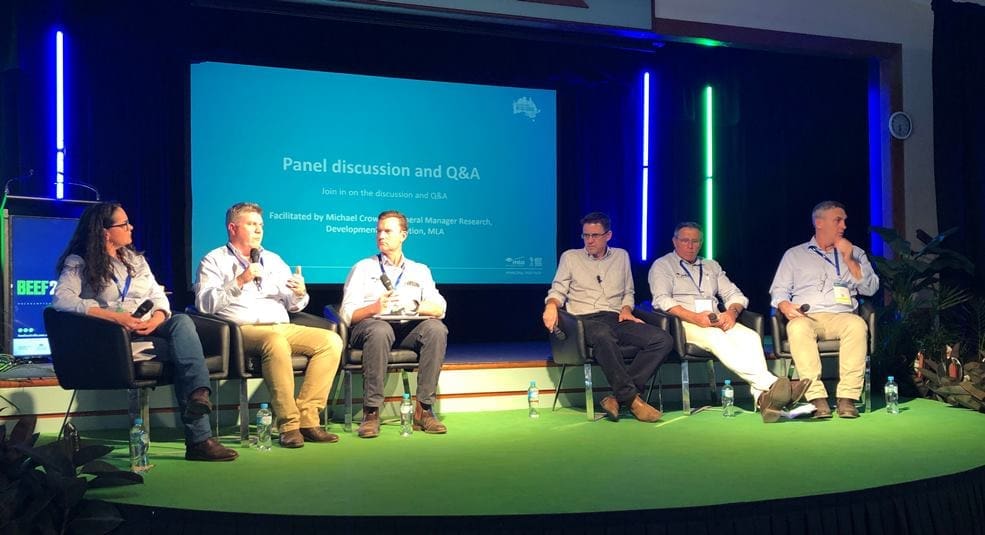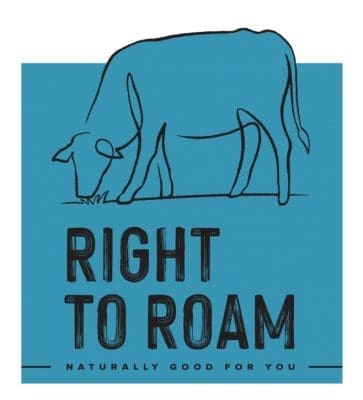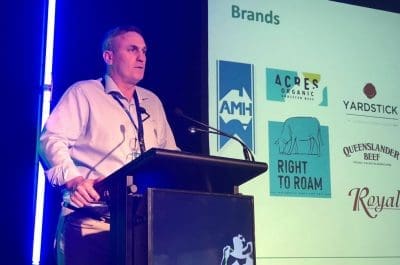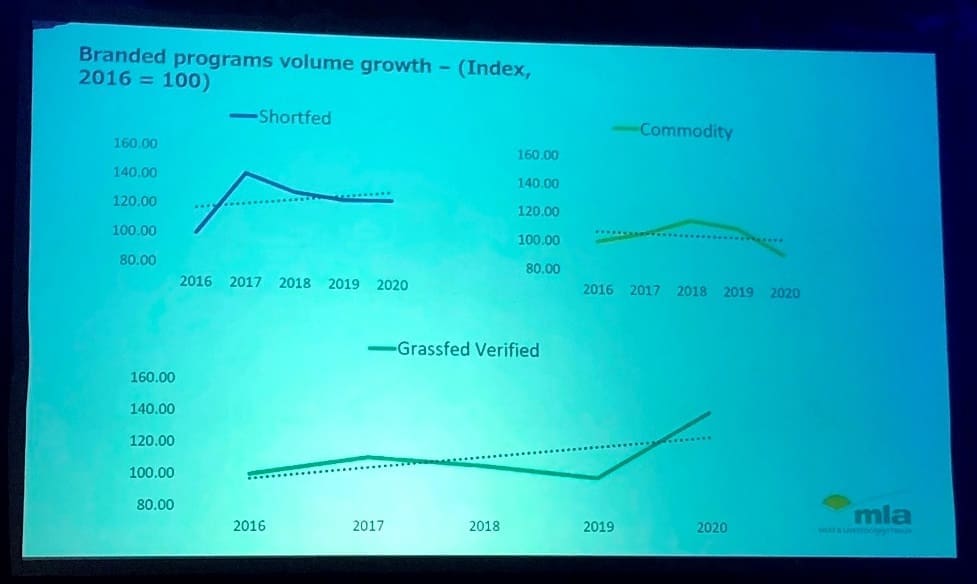
NH Foods Borthwicks Mackay manager Nick Meara addresses the ISC seminar at Beef 2021 last week
MOMENTUM continues to grow in certified grassfed branded beef programs in Queensland, with JBS the latest to join the list of suppliers.
The nation’s largest processor provided first details of its new Right to Roam Queensland farm-assured grassfed program during a seminar session at Beef 2021 last week.
While the program has been in existence for a couple of months, JBS has deliberately kept a low profile about its existence to this point – conscious of not letting demand get ahead of supply, until the program grows.

Among the ‘big three’ beef processors with multiple slaughter sites across Queensland, Teys has steadily grown its Grasslands certified grassfed program over the past four or five years, while NH Foods has also established a strong following for its Nature’s Fresh certified grassfed brand, established in 2019.
Grids for one of Queensland’s larger certified grassfed brand managers show a whopping 60c/kg premium this week for steers and heifers meeting the brand spec, over conventional non-implanted MSA yearling.
To put the evolution in certified grassfed brands into some context, it was only six years ago during Beef 2015, that the Cattle Council of Australia officially launched its new Pasturefed Cattle Assurance Scheme, upon which many early brand programs were based.
Asked to estimate the number of cattle now being processed in Queensland for certified or farm-assured grassfed brands among the ‘big three’ processors, one well-informed processing source suggested the current figure was likely to be somewhere between 2000 and 2500 head per week.
Wariness of seasonal volatility
Queensland, generally has been slower on the uptake of certified grassfed brands than southern states (especially larger corporate-controlled programs with real volume), primarily because of wariness about the risk of seasonal volatility disrupting supply. Continuity of supply is regarded as one of the fundamental requirements for such brand programs.
Manager of NH Foods’ Borthwicks Mackay plant, Nick Meara spoke during an Integrity Systems seminar session at Beef 2021 on Friday.
He provided some background about how his company (similar to others) had transitioned out of ‘commodity’ beef sales into markets like Japan in decades past, into branding, covering verified Black Angus, Wagyu, and more recently, certified grassfed programs.
NH Foods’ Wingham plant in NSW was the first to adopt a certified grassfed natural program with its Manning Valley Naturally brand, followed in 2019 by the Nature’s Fresh program in Queensland.
As this graph presented by Mr Meara shows, over the past five years, ‘commodity’ beef and shortfed production has plateaued, while grassfed verified has grown – especially sharply since 2019 – based on a 2016 index.
“It’s been challenging due to seasonal conditions, but coming out of COVID, we are seeing more growth coming out of our target markets for grassfed,” he said. Similarly, value growth (as opposed to volume) for the company was being seen in branded products, as opposed to the commodity end.
“However there are definitely seasonal challenges associated with running a certified grassfed program in Queensland,” Mr Meara said.
But management on-farm and improvement in genetics and nutrition through a lot of herds in Queensland was delivering a more consistent product, when underpinned by the MSA grading system. NH Foods’ Queensland certified grassfed brand has a lower MSA index minimum requirement than its southern version, making it a little easier to comply.
“With the incentives provided through a market premium in our grid, the amount of product that will flow through the grassfed program will only continue to grow, as producers are incentivised to invest back into their pastures, nutrition and genetics to hit the targets,” he said.
Doing more with grassfed cattle
During an address talking about his company’s expanding feedback process (separate story to come), JBS Australia Industry Stakeholder Manager Michael Finucan discussed his company’s range of export and domestic grain and grassfed beef brands, including its recently launched “Right to Roam – Naturally Good for you” certified grassfed brand out of Queensland.
“We already have customers in the US and elsewhere who want that product, and we see the opportunity there to build a certified grassfed program in Queensland,” Mr Finucan said.
“We will be pushing it hard to get those cattle that our customers want.”

JBS Industry Stakeholder Manager, Michael Finucan
JBS did some consumer research in order to come up with the brand name, Right to Roam, which captures some of the sentiment of what consumers felt important in a grassfed beef brand.
Currently the Right to Roam brand is being packed out of the JBS Rockhampton plant, but will be extended into other Queensland sites including Dinmore as the program grows.
Using a similar model as JBS Southern’s Great Southern program – arguably the largest and most successful certified grassfed program in Australia – the northern division’s new Right to Roam is a company-verified program, backed by on-farm audit.
A two-tiered grid will apply, separated by weight and dentition, with an MSA YG animal targeted at the domestic market, and a heavier PR animal (non-MSA) for export markets. Both will be HGP and antibiotic-free, in addition to a never-ever grain claim.
“We’ve had good success with our certified Organic program, and there is a growing base of suppliers in Central Queensland, particularly, who are interested in collaborating in grassfed ‘never-ever’ supply,” JBS’s Brendan Tatt said.
“Season is frequently a challenge in Queensland, and it’s always the same story – once you establish a brand program and build customers, either retail or food service, you have to be able to deliver, week in, week out. Cattle suppliers are helping us meet the challenge in underpinning that year-round supply assurance.”
“In our view, if a body is not going into a grainfed brand program, we have to go a step further with our grassfed cattle, to build a premium for them through verified programs like this, to stay away from the low-cost export producers around the world.”
“We just need to keep up-selling that product, through farm assurance programs like this to get more value out of it.”
- Coming up: JBS and ISC talk about new projects putting more performance feedback data back into the hands of producers, including animal health performance.

